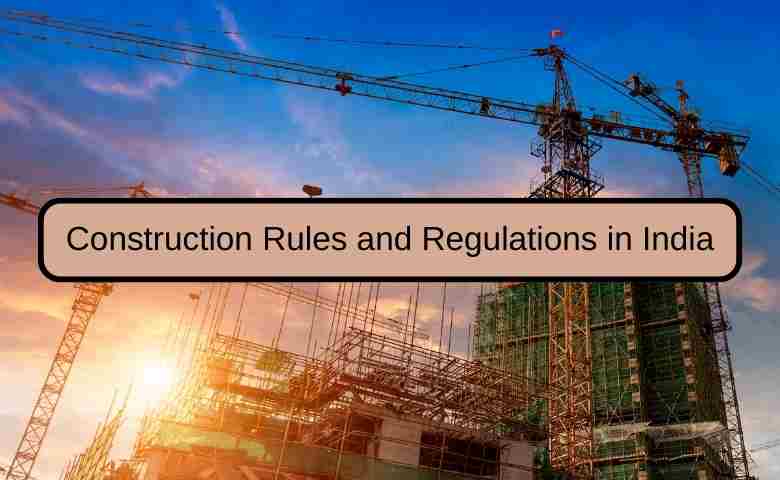Last Updated on November 16, 2024 by Admin
The construction industry in India is a cornerstone of the nation’s economy, playing a pivotal role in urbanization, infrastructure development, and economic growth. However, navigating the construction rules and regulations maze can be challenging for developers, contractors, and stakeholders. This guide explores the essential construction laws, permits, and compliance requirements in India, providing clarity and actionable insights for professionals in the sector.
Table of Contents
Understanding the Legal Framework for Construction in India
The construction industry in India operates under a robust legal framework designed to ensure safety, quality, and sustainability. Key components include:
- Constitutional Provisions: Land and property are state subjects, allowing state governments to establish regulations tailored to their regions.
- Central Legislations: Overarching laws, such as the Environment Protection Act of 1986 and the Contract Act of 1872, set national standards.
For an in-depth overview, consult ICLG’s Construction and Engineering Law guide for India.
Key Construction Laws in India
a. The Real Estate (Regulation and Development) Act, 2016 (RERA)
This act protects homebuyers and promotes transparency in real estate transactions. RERA mandates the registration of all real estate projects and agents.
b. The Indian Contract Act, 1872
It governs the formulation and enforcement of contracts, a critical aspect of construction agreements.
c. The Environment Protection Act, 1986
This act ensures that construction projects comply with environmental safeguards.
d. The Building and Other Construction Workers (Regulation of Employment and Conditions of Service) Act, 1996 (BOCW Act)
The BOCW Act emphasizes the welfare of construction workers, mandating their safety and fair working conditions.
Explore a detailed comparative analysis of construction laws here.
Permits and Approvals: A Step-by-Step Guide
Obtaining the necessary permits and approvals is crucial before commencing any construction project. The process involves:
- Land Title Verification: Ensuring clear ownership and absence of disputes.
- Land Use Zoning: Compliance with the Master Plan.
- Building Plan Approval: Plans must adhere to local municipal regulations.
- Environmental Clearance: Required for large-scale projects, ensuring minimal ecological disruption.
- NOCs from Relevant Authorities: These include fire safety, electricity, and water departments.
Refer to BricknBolt’s comprehensive guide on construction permits for step-by-step assistance.
Building Codes and Safety Regulations
India’s construction codes ensure structural integrity, safety, and efficiency. Key regulations include:
- National Building Code (NBC), 2016: Sets comprehensive standards for design, materials, and construction.
- Bureau of Indian Standards (BIS): Governs material quality.
- Fire Safety Norms: Enforced by local fire departments.
Non-compliance can lead to hefty penalties or project delays. Detailed insights into these codes can be found at Fluid Constructions.
Impact of Environmental Regulations on Construction
The construction sector is a significant contributor to environmental degradation. Regulations such as:
- Environmental Impact Assessment (EIA): Ensures projects assess and mitigate ecological harm.
- Waste Management Rules, 2016: Mandates proper disposal of construction debris.
Sustainable construction practices, including green building certification and the use of eco-friendly materials, are gaining prominence. Learn about sustainable building practices here.
Recent Amendments and Updates in Construction Laws
a. Digitization of Permits
Online portals for building plan approvals and tracking compliance have streamlined processes across states.
b. Increased Worker Safety Regulations
Recent updates emphasize worker health insurance and stricter penalties for safety violations.
c. Simplified GST Structure
A uniform 18% GST rate on construction services has reduced ambiguities.
Stay updated with the latest industry news at Construction Placements Industry News.
Future Trends and Challenges in Regulatory Compliance
The construction industry faces several evolving trends:
- Increased Adoption of Green Certifications: Developers are prioritizing LEED and GRIHA certifications to appeal to eco-conscious buyers.
- Integration of Building Information Modeling (BIM): Enhances compliance with structural and safety codes.
- Rising Labor Costs: Ensuring compliance with BOCW while maintaining profitability is challenging.
For actionable advice on adapting to these trends, visit Construction Placements Career Guides.
Additional Resources and Recommendations
Recommended Reading
- Understanding Civil Engineering Guides
- Courses for Construction Management
- Green Building Certification Resources
Expert Consultations
- Collaborate with legal experts specializing in construction law.
- Attend industry seminars and workshops to stay ahead of regulatory changes.
Final Thoughts
The construction industry in India offers vast opportunities but navigating its complex regulatory environment requires diligence and expertise. By understanding key laws, securing the necessary permits, and adhering to safety and environmental standards, stakeholders can ensure the successful execution of projects while minimizing risks.
Related Posts:
- Mastering Home Construction Planning: Your Essential Guide to a Dream Build
- How To Maintain A Safe And Sanitary Construction Site
- Starting a Home Building Company: A Complete Guide
- Why You Need a Construction Lawyer: Key Legal Issues in US Construction Projects


